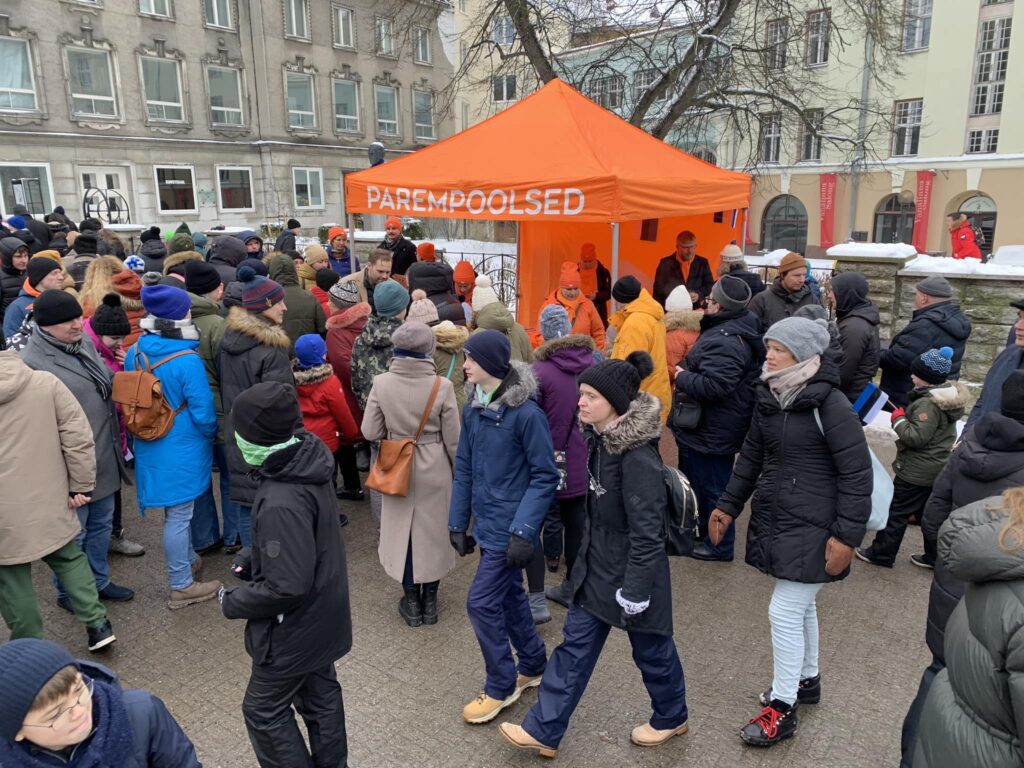Estonian journalist and author Paavo Kangur writes in his election commentary that in today’s Estonia, people usually vote for power and the party in power and that explains the Reform Party’s victory on 5 March; he also says the theme of these elections was a Freudian fear of death.
Single candidate from near Tallinn, an actor and a businessman, Vladas R. made no secret of the fact that he wanted to be elected to the parliament to make money. Many others said they were running for ideological reasons, but there was still a whiff of “I want more money” or the scent of a career politician in the air.
What is the difference between Estonia 200, the Right-wingers (a new political party, representing economic right – editor), Isamaa or the Social Democrats? I remember how the prime minister candidates of three parties were arguing at the Paide Opinion Festival. Their ideas were the same – they were just competing to see who could express those messages more eloquently. Largely, we could also see it at election debates.
The reality is harsh. The main increase in tax revenue comes from economic growth. When the economy is not growing, neither is the budget – or it’s growing only because of inflation. Tax systems in Europe are so well designed that only the naive believe there’s room for reform.
As you’re getting your salary, you’re paying at least 20%! When you go shopping, it’s additional 20%! And if you’re dumb enough to buy gas or cigarettes, you’re paying excise taxes so that your wallet goes into knots. And if you turn on your electric stove, you know what you’re risking.
Therefore, politicians can say whatever they like, but there is no room for change or improvement. But it’s always possible to make things worse!

Online voting is causing passions to rise
The electronic voting is still causing passions to rise. The Helme family (the leaders of the populist right-wing Estonian Conservative People’s Party, colloquially known as EKRE – editor) and the friends of EKRE think that online votes are all going to the Reform Party. Who knows, maybe they had about three more votes coming. The most useful is to take the election top 200 and look for yourself, who got how many votes.
In today’s Estonia, people usually vote for power and the party in power. The most popular are the ministers whose faces are on the TV all the time; a mayor or a school principal who is also a community leader, might also fit the bill. Actors, athletes and TV personalities have less hope. It is no longer 1992.
Cente Party lost 5,000 votes in Narva
As I have written a few books about politicians – but also about musicians – then I have a longer view. Usually, the Reform Party has got about 27% of the votes and the Centre Party’s haul has been the same – 27%. And the rest are left with 46%.
Let’s put it this way. Jüri Ratas’s (the leader of the Centre Party – editor) efforts in the Estonian version of “Dancing with the Stars” TV-show didn’t guarantee the loss of votes that happened because of Edgar Savisaar’s (the long-time leader of the Centre Party who died last year – editor) departure to the heavenly meadows, but also by smaller episodes.

In the predominantly Russian-speaking border town Narva, Mihhail Stalnuhhin’s (a former Centre Party politician who ran as a single candidate and didn’t win a seat in the parliament – editor) votes were completely lost. Mihhail, himself from Narva, ethnically a Tatar, characteristically a real Russian Man – who speaks very good Estonian, by the way – probably drank a little too much vodka in the autumn and then wrote a nasty article in the media about the removal of the Soviet tank from Narva!
I think there was such an episode in our homeland’s history – but who remembers it anymore. But no one should be surprised that, in the Estonian climate, someone takes one shot too many and says what they think. Happens! And, the Centre Party lost 5,000 votes!
No one wants a Russian missile shot in their bedroom
The theme of this election was security, the Estonian prime minister Kaja Kallas said. I would say more crudely – the theme of these elections was the fear of death, a Freudian fear of death. Today, the voters are not facing the question whether they want a new car, one more holiday or absolute equality and huge love.
It’s not that Estonians, with their Viking and Finno-Ugric genes, were afraid of death. But nobody wants that someone shoots a Kalibr missile (a Russian-made missile – editor) into their bedrooms.

If Putin were to bomb Helsinki – then St Petersburg, together with the villas of Putin’s friends, and half of Moscow would be wiped off the earth. Who knows those Finns, sometimes they’re very polite, but rarely. They’d probably retake Vyborg as well as Murom and Nefteyugansk (Russian cities – editor) and Yakutsk would be left for China. Gentlemen, don’t engage in bullshit!
But the big splash of the elections was the playboy of the year, Henrik Johannes Terras, candidate number 660, who got elected with a tiny number of votes (771 – editor). The entire Estonia was watching on TV how Henrik was fighting for the heart of a beautiful blonde in the local version of The Bachelorette. Nobody cared about Henrik’s political positions, but everyone was interested in what happened between him and the gorgeous Brigitte.
Editor’s note:
Estonians went to the polls on 5 March to elect a new parliament. The turnout was 63.7%, which is quite average for Estonian general elections; however, a record number of voters – 615,009 – made their voices heard.
The Reform Party won the election with 31.2% of the votes, gaining 37 seats (three more than previously) in the new parliament. EKRE came second with 16.1%, gaining 17 seats and having lost two, compared with the previous parliament. The Centre Party came third with 15.3% of the votes, gaining 16 seats – a whopping ten less than in the previous parliament.
A new party, Estonia 200 – entered the parliament for the first time with 13.3% of the votes and 14 seats. The Social Democrats got 9.3% of the votes and got nine seats – one less than before. The Isamaa party was the last to enter the parliament, having got 8.2% of the votes and eight seats – four less than in the previous parliament.
The opinions in this article are those of the author.


Interesting that the Parem Poolsed party did not win one seat in the Riigikogu.